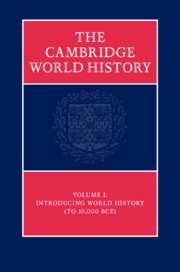Book contents
- The Cambridge World HistoryVolume I
- The Cambridge World History
- The Cambridge World History
- Copyright page
- Contents
- Figures
- Maps
- Table
- Contributors
- Preface
- Book part
- 1 Introduction and overview
- Part I Historiography, method, and themes
- 2 Writing world history
- 3 The evolution of world histories
- 4 Evolution, rupture, and periodization
- 5 From divergence to convergence: centrifugal and centripetal forces in history
- 6 Belief, knowledge, and language
- 7 Historiography of technology and innovation
- 8 Fire and fuel in human history
- 9 Family history and world history: from domestication to biopolitics
- 10 Gendered world history
- 11 What does anthropology contribute to world history?
- 12 Migration in human history
- Part II The Paleolithic and the beginnings of human history
- Index
- References
9 - Family history and world history: from domestication to biopolitics
from Part I - Historiography, method, and themes
Published online by Cambridge University Press: 05 May 2015
- The Cambridge World HistoryVolume I
- The Cambridge World History
- The Cambridge World History
- Copyright page
- Contents
- Figures
- Maps
- Table
- Contributors
- Preface
- Book part
- 1 Introduction and overview
- Part I Historiography, method, and themes
- 2 Writing world history
- 3 The evolution of world histories
- 4 Evolution, rupture, and periodization
- 5 From divergence to convergence: centrifugal and centripetal forces in history
- 6 Belief, knowledge, and language
- 7 Historiography of technology and innovation
- 8 Fire and fuel in human history
- 9 Family history and world history: from domestication to biopolitics
- 10 Gendered world history
- 11 What does anthropology contribute to world history?
- 12 Migration in human history
- Part II The Paleolithic and the beginnings of human history
- Index
- References
Summary
- Type
- Chapter
- Information
- The Cambridge World History , pp. 208 - 233Publisher: Cambridge University PressPrint publication year: 2015



